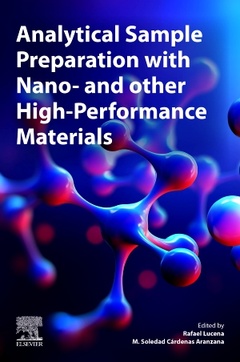Description
Analytical Sample Preparation With Nano- and Other High-Performance Materials
Language: English
Subject for Analytical Sample Preparation With Nano- and Other...:
560 p. · 15.2x22.8 cm · Paperback
Description
/li>Contents
/li>Biography
/li>Comment
/li>
Analytical Sample Preparation With Nano- and Other High-Performance Materials covers advanced sample treatment techniques and the new materials that can be used to boost their performance. The evolution of sample treatment over the last two decades has resulted in the development of new techniques and application of new materials. This is a must-have resource for those studying advanced analytical techniques and the role of high-performance materials in analytical chemistry. The book explains the underlying principles needed to properly understand sample preparation, and also examines the latest materials - including nanomaterials - that result in greater sensitivity and specificity.
The book begins with a section devoted to all the various sample preparation techniques and then continues with sections on high-performance sorbents and high-performance solvents.
SECTION 1. Analytical sample preparation 1. Sample treatment basics and trends 2. Solid phase extraction, classic and miniaturized techniques 3. Solid phase microextraction 4. Liquid-liquid extraction, classic and unconfined liquid phase microextraction 5. Confined liquid phase microextraction 6. Solid-liquid extraction techniques 7. Sampling-extraction integration techniques 8. Direct coupling of microextraction with instrumental techniques
SECTION 2. High performance sorbents 9. Polymeric phases 10. Selectivity enhanced sorbents 11. Carbon nanoparticles 12. Inorganic nanoparticles 13. Reticular materials 14. Composites 15. Monoliths
SECTION 3. High performance solvents 16. Ionic liquids 17. Switchable solvents 18. Deep eutectic solvents 19. Supramolecular solvents
Prof. Dr. M. Soledad Cárdenas Aranzana has been a full professor of Analytical Chemistry since 2009. Her research interests comprise microextraction techniques, including developing new approaches, synthesizing novel nanomaterials based on carbon, metallic nanoparticles and polymers. She has co-authored 202 scientific articles and contributed to 16 book chapters and an ebook (Microextraction Analytical Techniques, 2017, Bentham. She has presented 170 conference communications, co-supervised 16 doctoral theses, and participated in 7 contracts and 1 patent. She has acted as regular reviewer of the Spanish National Evaluation and Foresight Agency (ANEP) and external reviewer for the Portuguese Foundation of Science and Technology and the Agencia Nacional de Promoción Científica y Tecnológica (ANPCyT, Argentina). She has also been member of the expert panel for the evaluation of researchers in various national programs. Currently, she is president of the A3 Committee (Chemistry) of the Spanish National Agency for Qual
- Combines basic, fundamental principles and advanced concepts and applications for a comprehensive treatment of sample preparation with new materials
- Defines nano- and other high-performance materials in this context, including carbon nanoparticles, inorganic nanoparticles, ionic liquids, supramolecular solvents, and more
- Includes discussion of all the latest advancements and new findings in both techniques and materials used for proper sample preparation




